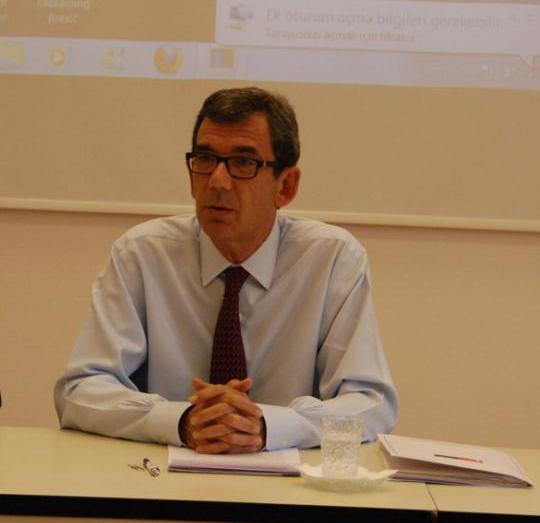EU Ambassador to Turkey Discusses EU, UN Roles in Addressing Global Challenges
 Ambassador Jean-Maurice Ripert, head of the Delegation of the European Union (EU) to Turkey, shared his views on the roles played by the EU and the United Nations (UN) in current international issues at a seminar organized by the Department of International Relations on May 8. The seminar was attended by around 30 students and faculty members from various departments, who showed a keen interest in the subject.
Ambassador Jean-Maurice Ripert, head of the Delegation of the European Union (EU) to Turkey, shared his views on the roles played by the EU and the United Nations (UN) in current international issues at a seminar organized by the Department of International Relations on May 8. The seminar was attended by around 30 students and faculty members from various departments, who showed a keen interest in the subject.
Head of the EU Delegation to Turkey since 2011, Ambassador Ripert also worked in the UN and related posts for a number of years. In his remarks at the seminar, he first highlighted commonalities between the UN and the EU, stressing the fact that they share the same values, work toward the same goals and were both founded to promote peace and security, so that the horrors of the past would never happen again.
He then presented facts and figures showing the high degree of interaction and cooperation between the two organizations, the EU being by far the largest contributor to UN programs. As major areas of cooperation, he mentioned peace and security; human rights, the rule of law and gender equality; human, social and economic development; protection of the environment; and humanitarian and food assistance. He emphasized the importance of the climate change issue for the EU, pointing out that the Union was committed to specific targets such as a 20 percent reduction of gas emissions. He also discussed the principle of the protection of civilians, stressing the significance of a new norm introduced in the UN system in 2005, the "responsibility to protect" (R2P) in case of mass atrocities.
After referring to the fact that the EU was granted an upgraded observer status in the UN in 2011, Ambassador Ripert also elaborated on the 2003 European Security Strategy and the 2009 Lisbon Treaty, which gave the EU more leverage with the creation of the post of president of the European Council and a European diplomatic service.
The seminar concluded with a lively question and answer session, with participants querying the ambassador on the EU's foreign policy, its involvement in multilateral organizations, the responsibility to protect and the EU approach regarding private security companies. A question on the EU's role in the Middle East permitted him to elaborate on the Union's position on the Middle East peace process, the Arab Spring and the Syrian crisis. The "unfair" decision-making system in the UN Security Council giving veto power to the five permanent members was also criticized, upon which Ambassador Ripert noted that consensus was a key rule and that the veto power was rarely used.
The seminar turned out to be a timely and fruitful event on the eve of May 9, Europe Day.